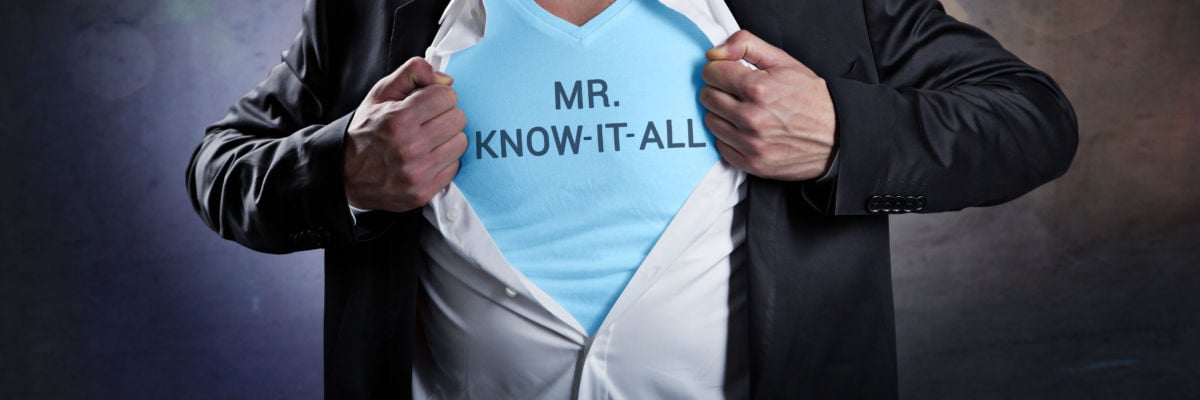
One of the great “sins” of Catholic apologetics is also the great capital sin of the moral life: pride. Pride is undue love of oneself—undue because it conflicts with reality. You and I may not be as good as we think we are. We may love ourselves too much. We can distort the legitimate appreciation we should have of the good residing in us or in what we have accomplished. We can fail to see or acknowledge that good as God’s gift. This is the sin of pride.
For an apologist, pride involves thinking more highly of one’s apologetical abilities than one should. The more effective an apologist someone becomes, the greater the temptation of seeing himself as “The Catholic Answer Man.”
“I have the arguments mastered,” someone may think. “I don’t have anything to learn.” He may forget that it is the Holy Spirit who reaches minds and hearts and brings people to faith, not the apologist’s cleverly crafted arguments operating on their own power.
Legitimate Catholic pride
Seldom of course do any of us succumb to pride in such a gross fashion. For the typical Catholic apologist, the temptation is subtler. Weary of attacks on his Catholic Faith and deeply appreciative of the richness of his Catholic heritage, he takes legitimate pride in being a Catholic. After all, don’t we say in the baptismal liturgy, “This is the faith of the Church; we are proud to profess it in Christ Jesus”? Didn’t Paul “boast” of Christ?
The danger comes when we move from recognizing our faith as a gift from God to thinking of it as a personal accomplishment or even a personal edge we have over others. For apologists, it can mean going from an authentic sense of accomplishment in the work to a boastful attitude: “Look at how many people I have converted! Look at how many debates I have won!”
Pride often leads to presumption. The apologist can begin to think himself capable of tackling any apologetical issue or answering any question. He may begin to reach beyond his abilities, in his own strength. He may assume that knowing the arguments necessarily means he can effectively present them, in any situation, better than anyone else.
Pride can also involve an arrogant dismissal of others and their perspectives. Of course, the Catholic apologist thinks Catholicism true. He thinks it better than non-Catholic religions. But that says nothing about the worth of the Catholic as a person in comparison with his non-Catholic neighbor.
Our Catholic Faith is God’s gift, not a personal accomplishment. Being Catholic does not mean we have nothing to learn from non-Catholics or that non-Catholics are by definition unintelligent for not having seen the truth of Catholicism.
Belittling Protestantism
A Catholic friend once belittled Calvinists as “mental midgets” because they believe in election and predestination. “How can any intelligent believer hold such things?” he gibed. Later, a Calvinist opponent showed him how Catholicism too affirms election and predestination, though not in the same way as Calvinism. The Calvinist went on to argue (rightly) that, with some important qualifications, the Thomistic view comes close to that of Calvinism. Since Thomas Aquinas was no mental midget, my friend had to eat humble pie. Calvinists aren’t so dumb after all, he admitted, even if, from the Catholic perspective, they are mistaken on some key issues.
I have seen this sort of thing among some cradle-Catholic apologists who have no deep familiarity with the intricacies of Protestant theology. They presume that because Catholicism is true and, by implication, Protestantism is false (at least where it differs with Catholicism), Protestantism is unsophisticated and has nothing to say for itself. I remember one cradle-Catholic apologist who once asserted that Protestants had no “real theologians” almost being floored by the erudition displayed by the then-Protestant, now-Orthodox Jaroslav Pelikan in his multivolume work, The Christian Tradition. I think it almost shook the Catholic apologist’s faith. Only someone grossly ignorant of Protestantism or grossly arrogant about Catholicism—or both—could react so.
Convert pitfalls
We converts from Protestantism, though far from ignorant of Protestant theology, can also succumb to pride when it comes to dealing with our former brethren. You see, we often feel that we’ve heard it all before. “Yes, I used to think as you do” was how I once put it to a Protestant acquaintance. What I said was true, but there was more than a touch of superiority lurking behind my words. May God forgive me if I drove the fellow further from the truth by my condescension.
One Protestant convert I know was so convinced of his ability to defend Catholicism that he claimed he could prove any Catholic belief or practice from the Bible alone. Think about the implication of that claim for a moment. In order for him to prove any Catholic belief or practice from the Bible alone, the Bible would have to be sufficient, in the Fundamentalist sense of the term. If every Catholic doctrine can be proved from the Bible alone, then Fundamentalists have been right about sola scriptura all along, even if they’ve been mistaken about the actual content of the Bible’s teaching. Only my friend’s arrogance kept him from seeing the irony.
Unanimity not apparent
Reading some early twentieth-century apologetics can help an apologist’s humility—that is, if he is disposed to learn. Many Catholic apologists of the last century took immense pleasure in gloating over Protestant disunity, in contrast to Catholicism’ s then-monolithic unity.
“Ask a Protestant clergyman a question, and you get one answer. Ask another the same question, and you get a different answer,” one writer declared. “But ask any Catholic priest a question and you get the same answer, no matter whom you ask. That is the difference between the Protestant churches and the Catholic Church.” Q.E.D.: Protestantism is false, Catholicism true.
Try that same experiment today, and you will get very different results. The Protestant clergy is as divided as ever, but what of the Catholic clergy? Go to a traditionalist parish, and Msgr. Smith will tell you what the Church teaches, sure enough. But down at St. Miscellaneous Parish Community of Faith, where Fr. Gus says the clown Masses and empowers people to do as they please, who knows what you’ll hear? Is contraception a sin? The Church and Msgr. Smith answer, “Of course.” But Fr. Gus isn’t sure. “What do you want me to say? That is for youand yourconscience to decide.”
The old argument can still be salvaged, because beneath the specific example is an enduring principle. A Catholic—especially a priest—looks to the authentic teaching of the magisterium, not his own private opinions. Indeed, he derives his beliefs from magisterial teaching. Priests today who give you their ideas instead of what the Church teaches simply are not behaving as Catholics. Fr. Gus simply fails to follow “the Catholic rule of faith,” as the old theology manuals put it, in formulating his reply. But every Catholic priest who does follow the Catholic rule of faith will give the same answer.
True disagreement
Protestant clergy, on the other hand, disagree among themselves. Perhaps in a given instance this results from ignoring or rejecting the Protestant rule of faith, the Bible alone. A Protestant minister may reject infant baptism because he no longer believes what the Bible says about original sin. He is like the priest who rejects the teaching of the magisterium. Thus the two examples cancel each other out.
Then again, the Protestant minister may reject infant baptism because he is a Baptist and doesn’t believe the Bible endorses it. He differs with his Lutheran, Anglican, and Presbyterian colleagues over the interpretation of the Bible but not because he rejects it as the rule of faith.
The point is, the old apologetics boasted about something it had no business boasting about—if it had any business boasting at all. The fact that at the time Catholic priests almost always answered according to Catholic teaching was no guarantee it would always be so. Perhaps no one could have anticipated the dissent and confusion that followed Vatican II. Still, dissent and confusion among the clergy weren’t invented in 1965 or 1968. One has only to think back to the modernist controversy at the turn of the century or to Reformation-era clergy.
Besides, the Church’s unity does not guarantee that priests will teach what they should, any more than the Church’s holiness guarantees priests will live holy lives. The oneness of the Church doesn’t vouchsafe a monolithic clergy, though the old apologetics sometimes sounded as if it did.
In need of purification
Some dissident Catholics wrongly see any staunch affirmation of Catholicism as triumphalism, but that doesn’t mean apologists never fall into the real thing. Triumphalism is an unwillingness to acknowledge adequately that the Church, though holy, is also always in need of purification in her members (see Catechism of the Catholic Church 827). It is a subtle form of bravado masquerading as faith and zeal, a vice made out to be a virtue. And it is counterproductive for apologetics. Truthfulness about Catholic shortcomings is obligatory, because truthfulness is obligatory.
But there’s also a practical benefit to us as apologists: If we’re honest about sins committed by Catholics, even by popes and bishops—often in Christ’s name—we give non-Catholics more reason to believe us in other matters. On the other hand, if we cannot admit unpleasant truths about Catholic history that are well-known, then how likely is it non-Catholics will listen to us when we proclaim truths others dispute?
We shouldn’t exaggerate Catholic sins, especially when so many today are willing to do that for us. But Catholics must acknowledge their sins, as recent popes have done repeatedly. Honesty and repentance are two prerequisites for growth in the spiritual life—including the apologist’s spiritual life.
During his pontificate, John Paul II confessed the sins of other Catholics in history, not his sins. We on the other hand may need to confess our own sins. Apologists often ask the disgruntled former Catholic to forgive the priest who “drove him from the Church” or the Catholic family member who grievously wronged him. Sometimes we even apologize for these people. It’s much harder to ask forgiveness for what we ourselves have done—especially if we did it in the name of the truth.



